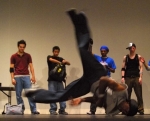Reaching the Underground Trendsetter A Challenge For Marketers

Culture journalist Xeni Jardin visits dance competition MAXT OUT organized by Joanna Vargas and reports on NPR about the rebellion against today's commercialized hip-hop and the resurgence of a favorite early 80's dance craze. Sick of lame, repetitive FM programming and the poser hip-hop that comes with it, many teens are now turning to word of mouth, Kazaa or CDs burned by friends to stay current with fresh underground hip-hop. The 80's dance craze breakdancing has also resurfaced and is popular among urban youth who use Bboy, Myspace.com and Friendster to find out where breakdance and other hip-hop events will occur.
For marketers seeking to ride trends and reach trendsetters, traditional media isn't going to do it and hasn't for a long time. They aren't watching and they aren't listening but leading and creating. Of course that's nothing new. They never have watched or listened but today with the exponential fragmentation of media and the shift in control from media conglomerates to individual, the challenges marketers face are reaching ever insurmountable levels.
In this word of mouth world, there's really no need or purpose for mass marketing anymore. It's more like clandestine detective work. Cultures and trends need to be infiltrated and experienced first hand with primary reaserch. The culture needs to be lived more than observed. By living it, the alpha-trendsetters can be identified. Once identified, the relationship between marketer and trendsetter becomes a precarious one not unlike the relationship between a drug dealer and an undercover cop. Of course, marketers don't have to and should not lie about their motivations. After they've been found and an open discussion has taken place they should be given the product, told what's great about, have any questions answered and then set free. This, as well, is not new. It's being done on a large scale by Tremor and on a small scale by an endless list guerilla and street marketers. Not unsurprisingly, it's easier said than done. But, then again, most everything is.

